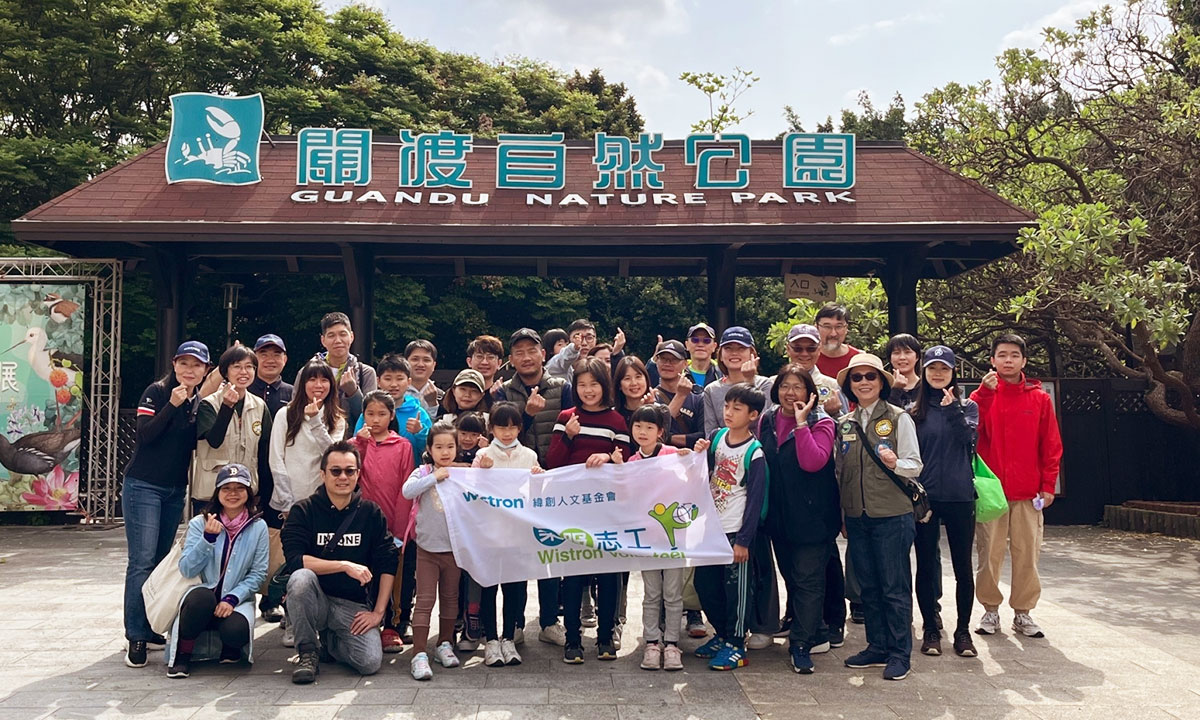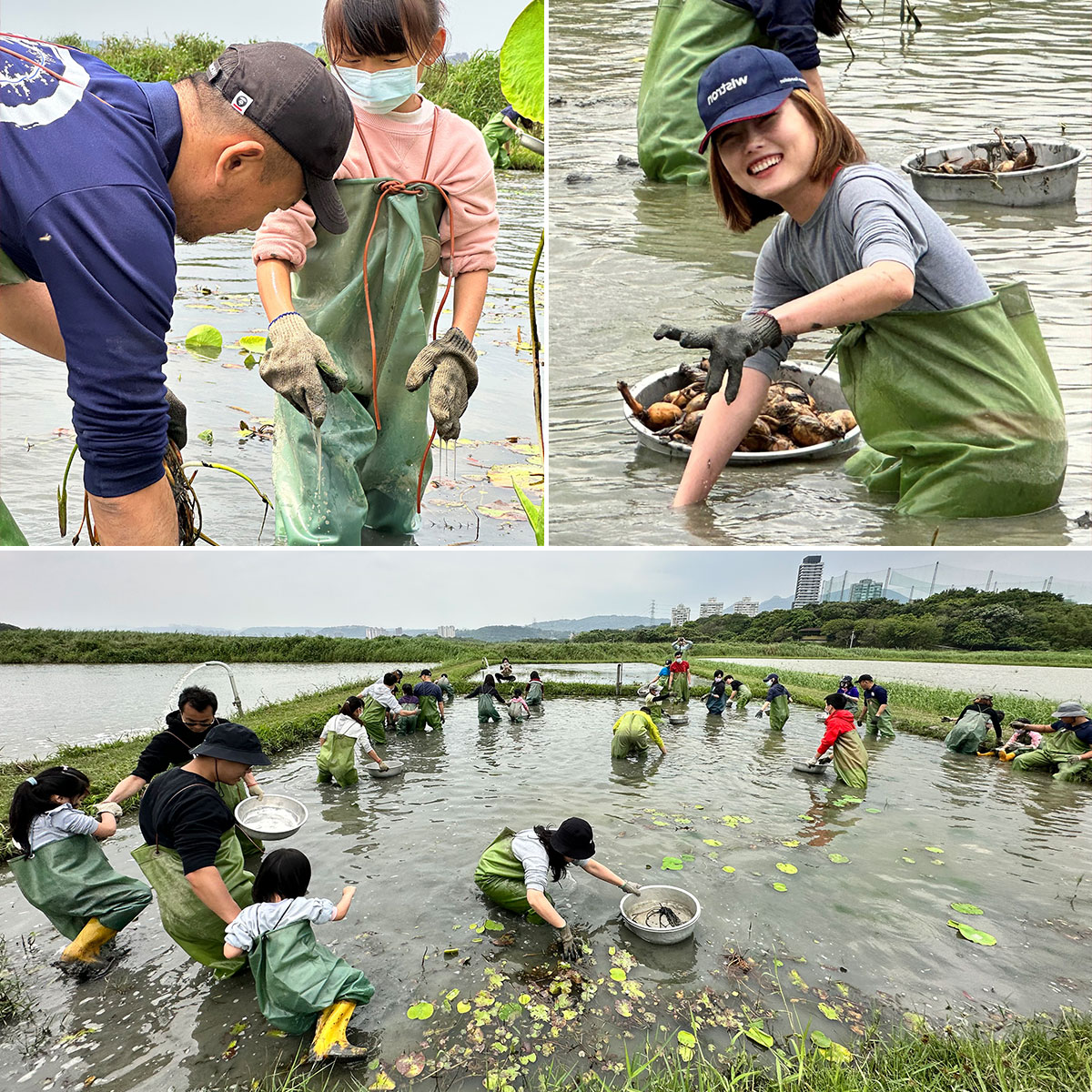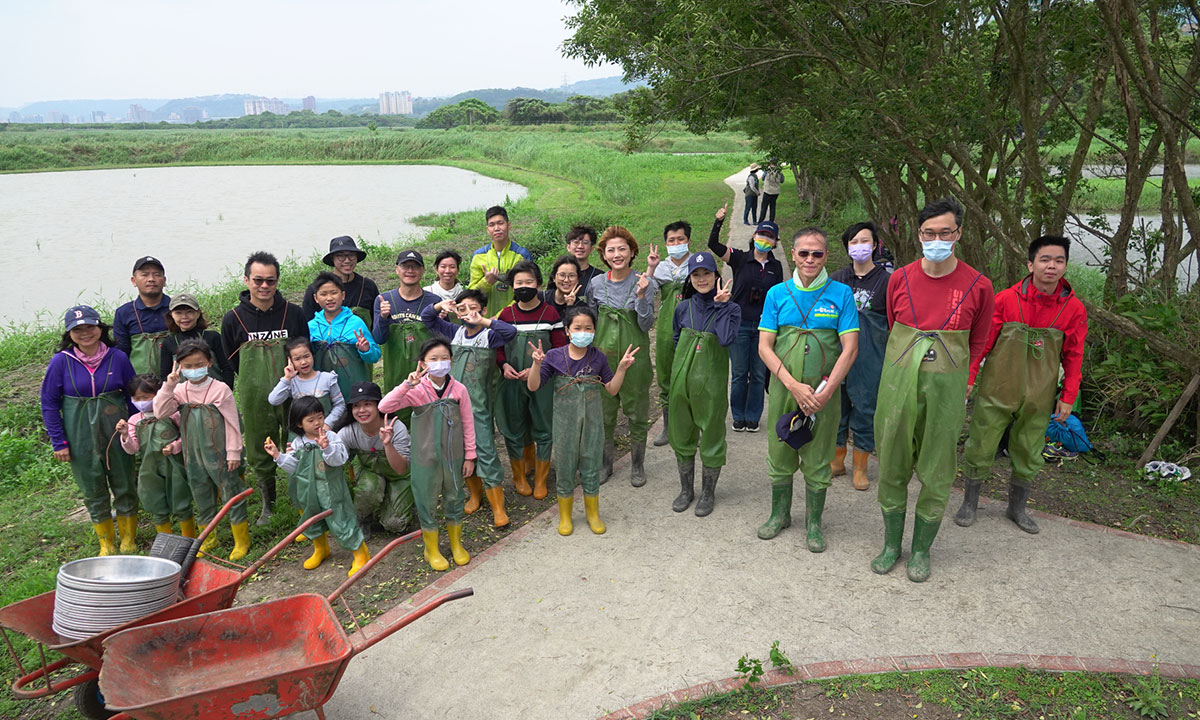
Guandu Nature Park is located at the confluence of the Tamsui and Keelung rivers. The blending of fresh and salt water and the ebb and flow of the tide have nurtured a vast Kandelia obovata mangrove wetland forest, which is not only the best-preserved wetland environment in the Taipei Basin, but also an important stop for migratory birds.
In 2022, the Wistron Foundation and Wild Bird Society of Taipei worked together to launch the "Moon Pond Preservation Project" in Guandu Nature Park to protect this globally crucial habitat of wild birds, and make use of beautiful ecological resources as a venue to encourage people to get close to, understand, and protect nature. At the same time, this project will help protect the habitat of water birds, providing a safe environment to representative bird species, such as the black-winged stilt and other water birds, to raise their chicks in Guandu Nature Park. This year, the foundation expanded the project area from the original 0.36 hectares to 3.36 hectares, and welcomed corporate volunteers to join a working holiday event at the wetland, aiding in creating an idyllic habitat for water birds.
The weather is always unpredictable in April, when chinaberry trees bloom. After having rained heavily for one or two days before the event, the rain stopped in the early morning of the working holiday event at Guandu Nature Park. With the floral fragrance of chinaberry in the air and pale purple petals covering the ground, nearly 30 Wistron volunteers and their families joined the Guandu Wetland Working Holiday event early on the weekend. They first listened to an introduction on the park’s environment and ecological features at a birdwatching cabin, organized by the Wild Bird Society of Taipei. This introduction also included detailed explanations on the relevant work preparations and precautions.

During this event, Wistron volunteers of all ages had the rare opportunity to wear rubber chest waders, which are commonly known as "frog suits." The faces of those who were wearing frog suits and participating for the first time were full of curiosity and excitement, mixed with nervousness and clumsiness in their movements. Thanks to the guidance and assistance of the staff, everyone successfully put on the suits. Subsequently, the group of volunteers navigated the park paths, crossed the control gate, and arrived at the "Heart Field Wetland," which is not open to the public. The "Heart Field" is located in the "Heart Field Wetland" and covers an area of about 0.7 hectares. In this field, different crops, such as lotus roots and rice, are planted according to the season. In this occasion, volunteers planted lotus roots in the field according to the season and weather. "The best time to plant lotus roots in Central and Northern Taiwan is in April. If we plant them too early, they will germinate too slowly and will not grow properly due to the low temperatures," the staff explained.

While the Wistron volunteers were still nervous about how to walk into the “Heart Field” confidently and safely, the skilled staff stepped into it in just a few steps. Looking at the staff in their frog suits waist-deep in water, the volunteers could not help looking worried and hesitant because every step they took could sink them deeper in the mud, as both their feet were in the swamp. "Walk slowly, so you don't get stuck deeper and deeper," the staff said encouragingly. Thanks to the guidance of the professional staff, the volunteers successfully planted lotus root seedlings in the field. Everyone worked together, showed the spirit of cooperation, supported and helped each other, and completed the task of planting lotus roots. Interestingly, a large number of parents and children attended this particular working holiday event. Everyone was excited for the lotus root seedlings they planted. After the lotus roots seedlings grow and mature in autumn, the volunteers will also have the opportunity to harvest and taste the rich and delicious lotus roots!
During the afternoon tour, the guide informed the group of every plant and tree in the park. It is hard to imagine that before Guandu Nature Park was established in 2001, people used to dump household waste and garbage in this land, severely damaging the habitat of animals and plants in the area. However, after more than 20 years of ecological restoration and forest succession development without interference, the trees have grown lush, birds are singing, and the flowers are blooming. Guandu Nature Park has also become an important place for conservation, education, research, and leisure.
Through this working holiday event at Guandu Nature Park, Wistron volunteers had the opportunity to go deep into the wetland, enter the "Heart Field," and plant the beauty of spring, participating in wetland protection actions and working together for a sustainable ecological environment.
 Guandu Nature Park is located at the confluence of the Tamsui and Keelung rivers. The blending of fresh and salt water and the ebb and flow of the tide have nurtured a vast Kandelia obovata mangrove wetland forest, which is not only the best-preserved wetland environment in the Taipei Basin, but also an important stop for migratory birds.
In 2022, the Wistron Foundation and Wild Bird Society of Taipei worked together to launch the "Moon Pond Preservation Project" in Guandu Nature Park to protect this globally crucial habitat of wild birds, and make use of beautiful ecological resources as a venue to encourage people to get close to, understand, and protect nature. At the same time, this project will help protect the habitat of water birds, providing a safe environment to representative bird species, such as the black-winged stilt and other water birds, to raise their chicks in Guandu Nature Park. This year, the foundation expanded the project area from the original 0.36 hectares to 3.36 hectares, and welcomed corporate volunteers to join a working holiday event at the wetland, aiding in creating an idyllic habitat for water birds.
The weather is always unpredictable in April, when chinaberry trees bloom. After having rained heavily for one or two days before the event, the rain stopped in the early morning of the working holiday event at Guandu Nature Park. With the floral fragrance of chinaberry in the air and pale purple petals covering the ground, nearly 30 Wistron volunteers and their families joined the Guandu Wetland Working Holiday event early on the weekend. They first listened to an introduction on the park’s environment and ecological features at a birdwatching cabin, organized by the Wild Bird Society of Taipei. This introduction also included detailed explanations on the relevant work preparations and precautions.
Guandu Nature Park is located at the confluence of the Tamsui and Keelung rivers. The blending of fresh and salt water and the ebb and flow of the tide have nurtured a vast Kandelia obovata mangrove wetland forest, which is not only the best-preserved wetland environment in the Taipei Basin, but also an important stop for migratory birds.
In 2022, the Wistron Foundation and Wild Bird Society of Taipei worked together to launch the "Moon Pond Preservation Project" in Guandu Nature Park to protect this globally crucial habitat of wild birds, and make use of beautiful ecological resources as a venue to encourage people to get close to, understand, and protect nature. At the same time, this project will help protect the habitat of water birds, providing a safe environment to representative bird species, such as the black-winged stilt and other water birds, to raise their chicks in Guandu Nature Park. This year, the foundation expanded the project area from the original 0.36 hectares to 3.36 hectares, and welcomed corporate volunteers to join a working holiday event at the wetland, aiding in creating an idyllic habitat for water birds.
The weather is always unpredictable in April, when chinaberry trees bloom. After having rained heavily for one or two days before the event, the rain stopped in the early morning of the working holiday event at Guandu Nature Park. With the floral fragrance of chinaberry in the air and pale purple petals covering the ground, nearly 30 Wistron volunteers and their families joined the Guandu Wetland Working Holiday event early on the weekend. They first listened to an introduction on the park’s environment and ecological features at a birdwatching cabin, organized by the Wild Bird Society of Taipei. This introduction also included detailed explanations on the relevant work preparations and precautions.
 During this event, Wistron volunteers of all ages had the rare opportunity to wear rubber chest waders, which are commonly known as "frog suits." The faces of those who were wearing frog suits and participating for the first time were full of curiosity and excitement, mixed with nervousness and clumsiness in their movements. Thanks to the guidance and assistance of the staff, everyone successfully put on the suits. Subsequently, the group of volunteers navigated the park paths, crossed the control gate, and arrived at the "Heart Field Wetland," which is not open to the public. The "Heart Field" is located in the "Heart Field Wetland" and covers an area of about 0.7 hectares. In this field, different crops, such as lotus roots and rice, are planted according to the season. In this occasion, volunteers planted lotus roots in the field according to the season and weather. "The best time to plant lotus roots in Central and Northern Taiwan is in April. If we plant them too early, they will germinate too slowly and will not grow properly due to the low temperatures," the staff explained.
During this event, Wistron volunteers of all ages had the rare opportunity to wear rubber chest waders, which are commonly known as "frog suits." The faces of those who were wearing frog suits and participating for the first time were full of curiosity and excitement, mixed with nervousness and clumsiness in their movements. Thanks to the guidance and assistance of the staff, everyone successfully put on the suits. Subsequently, the group of volunteers navigated the park paths, crossed the control gate, and arrived at the "Heart Field Wetland," which is not open to the public. The "Heart Field" is located in the "Heart Field Wetland" and covers an area of about 0.7 hectares. In this field, different crops, such as lotus roots and rice, are planted according to the season. In this occasion, volunteers planted lotus roots in the field according to the season and weather. "The best time to plant lotus roots in Central and Northern Taiwan is in April. If we plant them too early, they will germinate too slowly and will not grow properly due to the low temperatures," the staff explained.
 While the Wistron volunteers were still nervous about how to walk into the “Heart Field” confidently and safely, the skilled staff stepped into it in just a few steps. Looking at the staff in their frog suits waist-deep in water, the volunteers could not help looking worried and hesitant because every step they took could sink them deeper in the mud, as both their feet were in the swamp. "Walk slowly, so you don't get stuck deeper and deeper," the staff said encouragingly. Thanks to the guidance of the professional staff, the volunteers successfully planted lotus root seedlings in the field. Everyone worked together, showed the spirit of cooperation, supported and helped each other, and completed the task of planting lotus roots. Interestingly, a large number of parents and children attended this particular working holiday event. Everyone was excited for the lotus root seedlings they planted. After the lotus roots seedlings grow and mature in autumn, the volunteers will also have the opportunity to harvest and taste the rich and delicious lotus roots!
During the afternoon tour, the guide informed the group of every plant and tree in the park. It is hard to imagine that before Guandu Nature Park was established in 2001, people used to dump household waste and garbage in this land, severely damaging the habitat of animals and plants in the area. However, after more than 20 years of ecological restoration and forest succession development without interference, the trees have grown lush, birds are singing, and the flowers are blooming. Guandu Nature Park has also become an important place for conservation, education, research, and leisure.
Through this working holiday event at Guandu Nature Park, Wistron volunteers had the opportunity to go deep into the wetland, enter the "Heart Field," and plant the beauty of spring, participating in wetland protection actions and working together for a sustainable ecological environment.
While the Wistron volunteers were still nervous about how to walk into the “Heart Field” confidently and safely, the skilled staff stepped into it in just a few steps. Looking at the staff in their frog suits waist-deep in water, the volunteers could not help looking worried and hesitant because every step they took could sink them deeper in the mud, as both their feet were in the swamp. "Walk slowly, so you don't get stuck deeper and deeper," the staff said encouragingly. Thanks to the guidance of the professional staff, the volunteers successfully planted lotus root seedlings in the field. Everyone worked together, showed the spirit of cooperation, supported and helped each other, and completed the task of planting lotus roots. Interestingly, a large number of parents and children attended this particular working holiday event. Everyone was excited for the lotus root seedlings they planted. After the lotus roots seedlings grow and mature in autumn, the volunteers will also have the opportunity to harvest and taste the rich and delicious lotus roots!
During the afternoon tour, the guide informed the group of every plant and tree in the park. It is hard to imagine that before Guandu Nature Park was established in 2001, people used to dump household waste and garbage in this land, severely damaging the habitat of animals and plants in the area. However, after more than 20 years of ecological restoration and forest succession development without interference, the trees have grown lush, birds are singing, and the flowers are blooming. Guandu Nature Park has also become an important place for conservation, education, research, and leisure.
Through this working holiday event at Guandu Nature Park, Wistron volunteers had the opportunity to go deep into the wetland, enter the "Heart Field," and plant the beauty of spring, participating in wetland protection actions and working together for a sustainable ecological environment.




 中
中